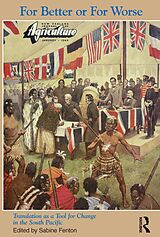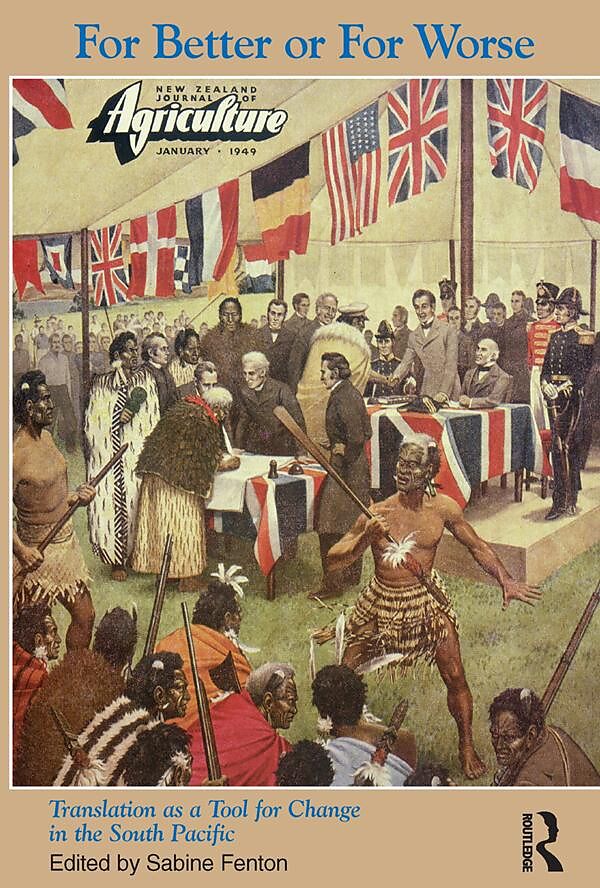For Better or for Worse
Einband:
E-Book (epub)
EAN:
9781317640561
Untertitel:
Translation as a Tool for Change in the South Pacific
Genre:
Sprach- und Literaturwissenschaft
Autor:
Sabine Fenton
Herausgeber:
Taylor & Francis
Anzahl Seiten:
294
Erscheinungsdatum:
16.07.2014
ISBN:
978-1-317-64056-1
The essays in this book explore the vital role translation has played in defining, changing and redefining linguistic, cultural, ethnic and political identities in several nations of the South Pacific
Inhalt
For Better or For Worse: Contents Introduction, Sabine Fenton, pp 1-9Some fifty years ago historians viewed the Pacific Islanders' encounter with the Europeans as a 'Fatal Impact'. "From this time onward the islands were pawns in the great game of international rivalries" (Oliver 1961:97). Colonized by the British, French and Germans, the Pacific Islanders were mostly portrayed as naïve victims of foreign exploitation and domination. This view of the effects of colonization is also shared by many postcolonial writers on translation. They have scrutinized and exposed the role translation played in the processes of colonization and termed the close relationship between both the "shameful history of translation" (Bassnett and Trivedi 1999:5). Today, however, many Pacific scholars recognize in their historic analyses the fact that the Pacific Islanders were not only victims but also played an active role in the cross-cultural events they were party to, helping to shape their own destinies. The writers of this volume of papers on translation in the Pacific are therefore putting forward a politics of double-inheritance. On the one hand, their essays provide evidence of the total transformation of the Pacific by the arrival of the Europeans. On the other hand, however, they also demonstrate the extent to which the changes were and still are today co-directed by the natives themselvesThe Humpty Dumpty Principle at Work: The Role of Mistranslation in the British Settlement of Aotearoa. The Declaration of Independence and He Whakaputanga o te Rangatiratanga o nga hapü o Nu Tïreni, Margaret Mutu, pp 12-35From 1840 to this day Mäori have protested that English immigrants to New Zealand were acting far in excess of the rights they had been afforded. Those rights derived from acknowledgement made by the King of England in 1836 of the paramount authority of Mäori chiefs in New Zealand as set out in He Whakaputanga o te Rangatiratanga o ngä Hapü o Nu Tïreni (the Mäori version of the Declaration of Independence) and the subsequent signing of Te Tiriti o Waitangi, a Mäori language treaty made between Mäori and the Queen of England. The rights conveyed included allowing the Queen of England to take responsibility for maintaining peace and good order amongst English immigrants while they lived under the paramount authority of Mäori chiefs as the rulers of their own country. Examination of the original nineteenth- century documents setting out these rights and conditions reveals that mistranslation has played a significant role in allowing the suppression of the protests of Mäori by English settlers. While the Mäori versions of official documents uphold the Mäori understandings, the English versions do not. The English versions convey the erroneous notion that Mäori were unsophisticated, child-like and desperately seeking English protection. Written histories of New Zealand almost all either disregard or refute the Mäori language versions of these documents and Mäori understandings of the nature of the Declaration and the Treaty. Oral traditions of many Mäori tribal groups around the country, on the other hand, have maintained these understandings. As a result Mäori continue to assert their sovereignty over New Zealand despite the severe disadvantages they now live under both numerically and in terms of all officially measured socio-economic indicators.Survival by Translation: The Case of Te Tiriti o Waitangi, Sabine Fenton & Paul Moon, pp 37-61 The Treaty of Waitangi was signed in 1840 by a representative of the British Crown, and a translation of it into Maori by over 500 Maori chiefs. The Treaty is considered the founding document of the New Zealand Nation. However, over the years serious misunderstandings have emerged as to what had actually been signed. While in the English version Maori had ceded their sovereignty to the British Crown, no such fundamental cession was agreed to in the Maori version. In this article the Treaty of Waitangi and its translation are investigated in their role as a double-edged tool: first in the hands of a colonizing power conqueringa nation, and secondly in the service of the colonized redressing past wrongs. The article begins by outlining briefly the historical background and the context in which the translation occurred, followed by an analysis of the main areas of misunderstanding in the two texts. The article then demonstrates how throughout history the translation not only ensured the survival of the Treaty of Waitangi itself but also that it became the corner-stone of Maori restistance and the guarantor of their economic and cultural survival. The present day societal impact of the Maori resistance based on the translation is explored and some future trends are suggested.Translating the Ancestors: Grey's Polynesian Mythology, John O'Leary, pp 63-88 Sir George Grey (1812-1898) is an important figure in the history of translation in the Pacific. His work as a translator, however, has been relatively little studied, despite the fact that his English-language version of Maori myths and legends, Polynesian Mythology (1855) exerted, and still exerts, a determining influence on how this Pacific mythology was and is perceived. In this article, Grey's intellectual and philological interests are described, his translation practices are discussed, and his book is analyzed in terms of other, earlier accounts of indigenous mythologies; also described are the book's intended audience, and Grey's treatment of his Maori-language source text, Nga Mahi a Nga Tupuna [The Deeds of the Ancestors] (1854). Special attention is paid to Grey's translation of the Hinemoa legend, which for complex historical and cultural reasons was extremely popular with Grey's mid-nineteenth-century European readers.Interpreting as a Tool for Empowerment of the New Zealand Deaf Community, Rachel Locker McKee, pp 89-132Interpreting has been an enabling mechanism in the New Zealand Deaf community's assertion of their identity and agenda as a linguistic minority. This chapter examines sociolinguistic impacts of interpreting and interpreters on the New Zealand Deaf-world over the period 1985 -2002, in which professional interpreting services have been available. Also considered are ways in which interpreting has the disempowering potential to create an illusion of access or independence that has not been actualised. As one of the first group of sign language interpreters trained in 1985, the writer bases the analysis on her involvement in the development of the profession and her observation of the Deaf/hearing interface since that time. Although written from an interpreter's point of view, the chapter also draws upon Deaf people's accounts of their experiences regarding interpreting.Translation in New Caledonia: Writing (in) the Language of the Other The "Red Virgin", the Missionary, and the Ethnographer, Raylene Ramsay, pp 133-170This study turns on the centrality of translation in New Caledonian culture. It traces the interaction between two cultures, European and Kanak, through the translation work of major figures: the translation of Kanak tales at the height of the colonial enterprise by Louise Michel, deportee from the Paris Commune; the pioneering work of the first French Protestant missionary, Maurice Leenhardt in the early twentieth century, and the contemporary work on texts in Paici and Cemuhi by the ethnographer Alban Bensa. More than half of the texts of indigenous Kanak oral literature exist only in translation. In its turn, the translation of these texts has influenced the emergence of literature by a settler population of European origin. We follow the con…

Leider konnten wir für diesen Artikel keine Preise ermitteln ...
billigbuch.ch sucht jetzt für Sie die besten Angebote ...
Die aktuellen Verkaufspreise von 6 Onlineshops werden in Realtime abgefragt.
Sie können das gewünschte Produkt anschliessend direkt beim Anbieter Ihrer Wahl bestellen.
Loading...
Die aktuellen Verkaufspreise von 6 Onlineshops werden in Realtime abgefragt.
Sie können das gewünschte Produkt anschliessend direkt beim Anbieter Ihrer Wahl bestellen.
| # | Onlineshop | Preis CHF | Versand CHF | Total CHF | ||
|---|---|---|---|---|---|---|
| 1 | Seller | 0.00 | 0.00 | 0.00 |
